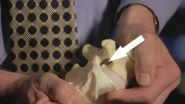(Press-News.org) CHICAGO (September 10, 2014) – Nationally, hand hygiene adherence by healthcare workers remains staggeringly low despite its critical importance in infection control. A study in the October issue of Infection Control and Hospital Epidemiology, the journal of the Society for Healthcare Epidemiology of America (SHEA), found that healthcare workers' adherence to hand hygiene is better when other workers are nearby.
"Social network effects, or peer effects, have been associated with smoking, obesity, happiness and worker productivity. As we found, this influence extends to hand hygiene compliance, too," said Philip Polgreen, MD, an author of the study. "Healthcare workers' proximity to their peers had a positive effect on their hand hygiene adherence."
Researchers at the University of Iowa's Carver College of Medicine used a custom-built, badge-based system to estimate hand hygiene compliance and opportunities, as well as the location and proximity of every healthcare worker in the medical intensive care unit of the University of Iowa Hospital and Clinics during a 10-day period for 24-hours a day. Badges were randomly provided at the start of each shift to physicians, nurses and critical care staff. The badges collected information from healthcare workers within proximity and hand hygiene compliance when entering and exiting a patient room. In total, more than 47,000 hand hygiene opportunities were recorded.
The estimated hand hygiene rate was 7 percent higher (28 percent vs 21 percent) when healthcare workers were in close proximity to peers when compared with the rate when healthcare workers were alone. In general, the researchers found that the magnitude of the peer effects increased in the presence of additional healthcare workers, but only up to a point.
The authors note that the results speak to the importance of the social environment in healthcare and have important implications for understanding how human behavior affects the spread of diseases within healthcare settings.
INFORMATION:
Mauricio N. Monsalve, MS, Sriram V. Pemmaraju, PhD, Geb W. Thomas, PhD, Ted Herman, PhD, Alberto M. Segre, PhD, Philip M. Polgreen, MD. "Do Peer Effects Improve Hand Hygiene Adherence Among Healthcare Workers?" Infection Control and Hospital Epidemiology [35:10] (October 2014).
Published through a partnership between the Society for Healthcare Epidemiology of America and The University of Chicago Press, Infection Control and Hospital Epidemiology provides original, peer-reviewed scientific articles for anyone involved with an infection control or epidemiology program in a hospital or healthcare facility. ICHE is ranked 13 out of 158 journals in its discipline in the latest Web of Knowledge Journal Citation Reports from Thomson Reuters.
SHEA is a professional society representing more than 2,000 physicians and other healthcare professionals globally with expertise in and passion for healthcare epidemiology and infection prevention. SHEA's mission is to prevent and control healthcare-associated infections and advance the field of healthcare epidemiology. The society promotes science and research, develops expert guidelines and guidance for healthcare workers, provides high-quality education, promotes antimicrobial stewardship, encourages transparency in public reporting related to HAIs, works to ensure a safe healthcare environment, and facilitates the exchange of knowledge. SHEA upholds the value and critical contributions of healthcare epidemiology to improving patient care and healthcare worker safety in all healthcare settings. Visit SHEA online at http://www.shea-online.org, http://www.facebook.com/SHEApreventingHAIs and @SHEA_Epi.
Healthcare workers wash hands more often when in presence of peers
Findings highlight the effect of peer pressure on behavior in the healthcare setting
2014-09-10
ELSE PRESS RELEASES FROM THIS DATE:
A novel method for portable detection of potent drugs known as 'bath salts'
2014-09-10
Despite being outlawed in 2012 in the U.S., the synthetic drugs known as "bath salts" — which really aren't meant for your daily bath — are still readily available in some retail shops, on the Internet and on the streets. To help law enforcement, scientists are developing a novel method that could be the basis for the first portable, on-site testing device for identifying the drugs. They report their advance in the ACS journal Analytical Chemistry.
Craig E. Banks, in collaboration with Oliver Sutcliffe, notes that the high-inducing substances in bath salts, which are ...
Scientists express concern over long-term vision for satellite-based research
2014-09-10
The U.S. has more than 30 civilian, Earth-observing satellites circling the planet, providing scientists with a torrent of crucial environmental and climate information. More satellites are on deck to launch in the next few years. But, according to an article in Chemical & Engineering News (C&EN), the weekly news magazine of the American Chemical Society, scientists have registered serious concerns over the lack of a long-term, cohesive vision for the scientific missions.
Jyllian Kemsley, a senior editor at C&EN, reports that satellites are marvels of technology. From ...
Penn engineers advance understanding of graphene's friction properties
2014-09-10
An interdisciplinary team of engineers from the University of Pennsylvania has made a discovery regarding the surface properties of graphene, the Nobel-prize winning material that consists of an atomically thin sheet of carbon atoms.
On the macroscale, adding fluorine atoms to carbon-based materials makes for water-repellant, non-stick surfaces, such as Teflon. However, on the nanoscale, adding fluorine to graphene had been reported to vastly increase the friction experienced when sliding against the material.
Through a combination of physical experiments and atomistic ...
Video game teaches kids how to code
2014-09-10
Computer scientists at the University of California, San Diego have successfully funded on Kickstarter a new and improved version of CodeSpells, a first-person player game they developed that teaches players how to code.
The game's previous iteration, developed by UC San Diego computer science Ph.D. students Sarah Esper and Stephen Foster, has been in use in dozens of schools throughout the world for more than a year. The researchers have been using the game as a platform to learn about the best ways to teach children how to code. They have presented their findings at ...
Thyroid cancer rates in Pennsylvania rising faster than rest of country
2014-09-10
Incidence of thyroid cancer is rising faster in Pennsylvania than in the rest of the United States, according to Penn State College of Medicine researchers.
"Since the mid-1970s, the incidence of thyroid cancer in the United States has more than tripled," said Dr. David Goldenberg, professor of surgery and medicine. "Thyroid cancer is now the seventh leading type of cancer in the nation. It typically occurs in young women and is projected to become the third most common cancer in women by 2019."
Papillary thyroid cancer, responsible for most of this increase, is very ...
An appetite for life
2014-09-10
A simple question about appetite can provide insights into old people's general health that may help reduce their risk of dying.
In a study published in the journal Appetite, Emeritus Professor Mark Wahlqvist from Monash University's Department of Epidemiology and Preventive Medicine and the Monash Asia Institute, led a team investigating the connection between appetite and mortality.
"Appetite is generally regarded as one of the most important indicators of health," Professor Wahlqvist said.
The urge to eat is often reduced in the elderly, with many afflicted by ...
Researchers unlock the genetic code of cancer-causing liver fluke parasite
2014-09-10
Singapore—An international team of scientists from Singapore, Thailand, China and Australia has cracked the genetic code of the liver fluke parasite, Opisthorchis viverrini, using a unique DNA analysis technique developed at A*STAR's Genome Institute of Singapore (GIS).
GIS's DNA analysis technique has allowed the researchers to further study the biology of Opisthorchis viverrini to understand the cause and the eventual development of treatments for bile duct cancer, a condition caused by the parasite. The breakthrough was published in the scientific journal Nature Communications.
Opisthorchis ...
Back pain killing your sex life?
2014-09-10
VIDEO:
Contrary to popular belief, spooning is not always the best sex position for those with a bad back, according to research from the University of Waterloo. For the first time...
Click here for more information.
Contrary to popular belief, spooning is not always the best sex position for those with a bad back, according to new research from the University of Waterloo.
For the first time ever, scientists have successfully documented the way the spine moves during sex ...
US cityscapes show consistent patterns of 'urban evolution'
2014-09-10
Most people think of city landscapes as simpler, diminished versions of the wild forests and free-flowing streams found in remote places. But in a series of studies published Sept. 10, 2014 in a special issue of the journal Biogeochemistry, scientists specializing in urban ecosystems say just the opposite is true. Urban landscapes are more complex than they seem, and from coast to coast these ecosystems can work in surprisingly similar ways, regardless of local conditions. And they have the potential to change quickly – for better or worse – depending on how people manage ...
Study shows that in baboons, as well as humans, social relationships matter
2014-09-10
Elizabeth Archie, Clare Booth Luce Assistant Professor in the Department of Biological Sciences at Notre Dame and colleagues used an incredibly rich data set on the social relationships of wild baboons which was collected on an almost daily basis, year-round, since 1984 by the Amboseli Baboon Research Project. The project, which Archie helps direct, is a long-term study of wild baboons that follows the lives of individual baboons, watching what they do and who they interact with.
"We can tell individual baboons apart by distinct features of their appearance, such as their ...
LAST 30 PRESS RELEASES:
Political polarization can spur CO2 emissions, stymie climate action
Researchers develop new strategy for improving inverted perovskite solar cells
Yes! The role of YAP and CTGF as potential therapeutic targets for preventing severe liver disease
Pancreatic cancer may begin hiding from the immune system earlier than we thought
Robotic wing inspired by nature delivers leap in underwater stability
A clinical reveals that aniridia causes a progressive loss of corneal sensitivity
Fossil amber reveals the secret lives of Cretaceous ants
Predicting extreme rainfall through novel spatial modeling
The Lancet: First-ever in-utero stem cell therapy for fetal spina bifida repair is safe, study finds
Nanoplastics can interact with Salmonella to affect food safety, study shows
Eric Moore, M.D., elected to Mayo Clinic Board of Trustees
NYU named “research powerhouse” in new analysis
New polymer materials may offer breakthrough solution for hard-to-remove PFAS in water
Biochar can either curb or boost greenhouse gas emissions depending on soil conditions, new study finds
Nanobiochar emerges as a next generation solution for cleaner water, healthier soils, and resilient ecosystems
Study finds more parents saying ‘No’ to vitamin K, putting babies’ brains at risk
Scientists develop new gut health measure that tracks disease
Rice gene discovery could cut fertiliser use while protecting yields
Jumping ‘DNA parasites’ linked to early stages of tumour formation
Ultra-sensitive CAR T cells provide potential strategy to treat solid tumors
Early Neanderthal-Human interbreeding was strongly sex biased
North American bird declines are widespread and accelerating in agricultural hotspots
Researchers recommend strategies for improved genetic privacy legislation
How birds achieve sweet success
More sensitive cell therapy may be a HIT against solid cancers
Scientists map how aging reshapes cells across the entire mammalian body
Hotspots of accelerated bird decline linked to agricultural activity
How ancient attraction shaped the human genome
NJIT faculty named Senior Members of the National Academy of Inventors
App aids substance use recovery in vulnerable populations
[Press-News.org] Healthcare workers wash hands more often when in presence of peersFindings highlight the effect of peer pressure on behavior in the healthcare setting




